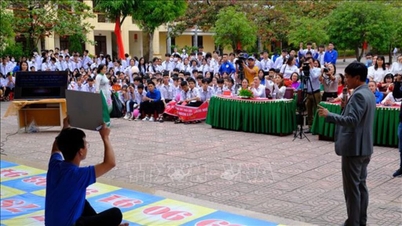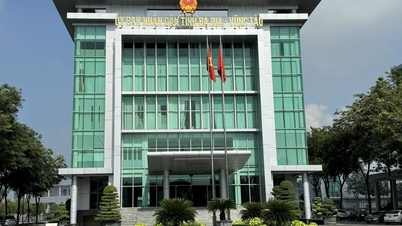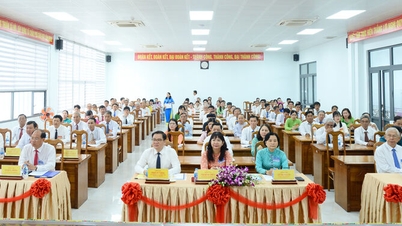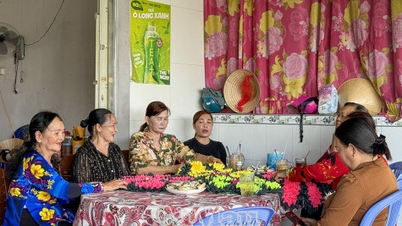Programs and materials for teaching and learning in foreign languages
Regarding requirements for teaching and learning in foreign languages, the Decree specifically stipulates the programs, textbooks, and materials used for teaching and learning in foreign languages and the authority to approve programs, textbooks, and teaching materials for each type of educational institution.
Accordingly, general education institutions implementing the Vietnamese General Education Program are allowed to teach and learn certain subjects, educational activities or some contents of certain subjects and educational activities in foreign languages, with priority given to subjects in the fields of mathematics, natural sciences , technology and information technology.
The continuing education program is partly taught and learned in a foreign language. The director of the continuing education institution is responsible for selecting the teaching materials and materials in a foreign language, which are issued or approved by the Ministry of Education and Training , or selecting materials from higher education institutions, vocational education institutions, domestic and international educational organizations that are suitable to the needs of learners and the capacity of the continuing education institution;
For vocational education , the programs of the majors and occupations that have been granted a certificate of registration for vocational education activities by the competent authority or of the majors and occupations that are autonomously opening majors according to the provisions of law are organized to teach in part or in full in a foreign language. The textbooks and materials used for teaching and learning in a foreign language are approved by the Principal or Director of the vocational education institution based on the appraisal results of the Appraisal Council established by the Principal, ensuring compliance with the process of appraising textbooks and materials.
For higher education , programs, textbooks, subjects, modules, and credits of higher education that have been approved by competent authorities are taught in part or in whole in a foreign language. Higher education textbooks and materials used for teaching and learning in a foreign language are approved by the Director or Principal of the higher education institution based on the appraisal results of the Appraisal Council established by the Principal, ensuring compliance with the process of appraising textbooks and materials....
The application of new technologies in teaching is also encouraged. The Decree clearly states: Application of information technology, artificial intelligence, digital transformation in teaching and learning in foreign languages in educational institutions through the use of technology tools and platforms to support teaching and learning, including the construction of online learning systems, textbook systems, electronic documents, student management and assessment of learning outcomes.
Teachers must have at least level 4 foreign language proficiency.
The Decree details requirements on expertise, professionalism and foreign language proficiency for teachers.
Accordingly, teachers must meet the requirements on expertise, profession, training level and fostering according to regulations for each level of education and training level.
Regarding foreign language proficiency, primary and secondary school teachers must have a minimum foreign language proficiency level 4 according to the 6-level foreign language proficiency framework for Vietnam or equivalent; high school teachers must have a minimum foreign language proficiency level 5.
Teachers of vocational education levels must have at least level 5 foreign language proficiency.
Lecturers teaching at university levels must have foreign language proficiency that meets the teaching requirements of the training program, at least level 5.
The Decree also stipulates: People who have received full-time undergraduate, master's, or doctoral training abroad with a foreign language as the language of instruction and have a recognized diploma according to regulations or have a bachelor's degree in foreign languages or foreign language pedagogy in Vietnam are exempt from foreign language proficiency requirements.
Tuition fees
Article 9 of the Decree clearly stipulates the collection, use and management of tuition fees for teaching and learning in foreign languages for each type of educational institution.
For public general education and continuing education institutions , tuition fees for organizing teaching and learning in foreign languages are collected according to the principles of correct calculation, full calculation, revenue to cover expenditure and with the consent of learners. The collection, use and management of these tuition fees are implemented according to the regulations of the People's Councils of provinces and centrally run cities.
For public vocational education institutions , the level of financial autonomy and the ability to pay of learners shall be determined based on economic and technical norms according to the provisions of the Law on Vocational Education and the Government's regulations on the mechanism of tuition management for vocational education institutions in the national education system; tuition fees shall be made public before enrollment and the learners and society shall be responsible for explaining the tuition fees.
For public higher education institutions , based on the level of financial autonomy and the ability to pay of learners, the tuition fee level shall be determined on the basis of economic and technical norms according to the provisions of the Law on Higher Education and the Government's regulations on the tuition fee management mechanism for public higher education institutions in the national education system; tuition fee levels shall be made public before enrollment and the learners and society shall be responsible for explaining the tuition fee levels.
For private educational institutions , they must proactively develop tuition fees for each school year and course for each subject, module, unit, educational activity, and content taught and learned in a foreign language to ensure cost recovery and reasonable accumulation, and be responsible for publicly disclosing and explaining to learners and society the tuition fees decided by the educational institution. At the same time, private educational institutions are responsible for explaining the average tuition fee per student, the annual tuition fee, and the tuition fee for the entire level of education; explaining the roadmap and tuition fee increase rate for the following years, and implementing it publicly and transparently according to the provisions of law, and explaining to learners and society.
The collection, use and management of tuition fees for teaching and learning in foreign languages at schools of state agencies, political organizations, socio-political organizations and armed forces shall comply with current laws.
The use of tuition fees to cover the costs of teaching and learning in a foreign language, including paying teachers' salaries. Expenditures from tuition fees are made in accordance with current laws.
The management of tuition fees, accounting and statistics, synthesis, and annual financial reporting of the unit are carried out in accordance with current laws, ensuring publicity and transparency. Educational institutions must comply with the requirements of inspection, examination, and auditing by financial agencies, auditing agencies, and competent educational management agencies regarding teaching and learning in foreign languages.
Source: https://phunuvietnam.vn/tu-25-9-ap-dung-quy-dinh-moi-ve-day-va-hoc-bang-tieng-nuoc-ngoai-20250808224459363.htm


![[Photo] The 1st Congress of Phu Tho Provincial Party Committee, term 2025-2030](https://vphoto.vietnam.vn/thumb/1200x675/vietnam/resource/IMAGE/2025/9/30/1507da06216649bba8a1ce6251816820)
![[Photo] President Luong Cuong receives President of the Cuban National Assembly Esteban Lazo Hernandez](https://vphoto.vietnam.vn/thumb/1200x675/vietnam/resource/IMAGE/2025/9/30/4d38932911c24f6ea1936252bd5427fa)

![[Photo] Panorama of the cable-stayed bridge, the final bottleneck of the Ben Luc-Long Thanh expressway](https://vphoto.vietnam.vn/thumb/1200x675/vietnam/resource/IMAGE/2025/9/30/391fdf21025541d6b2f092e49a17243f)
![[Photo] Solemn opening of the 12th Military Party Congress for the 2025-2030 term](https://vphoto.vietnam.vn/thumb/1200x675/vietnam/resource/IMAGE/2025/9/30/2cd383b3130d41a1a4b5ace0d5eb989d)
![[Photo] General Secretary To Lam, Secretary of the Central Military Commission attends the 12th Party Congress of the Army](https://vphoto.vietnam.vn/thumb/1200x675/vietnam/resource/IMAGE/2025/9/30/9b63aaa37ddb472ead84e3870a8ae825)


































































































Comment (0)